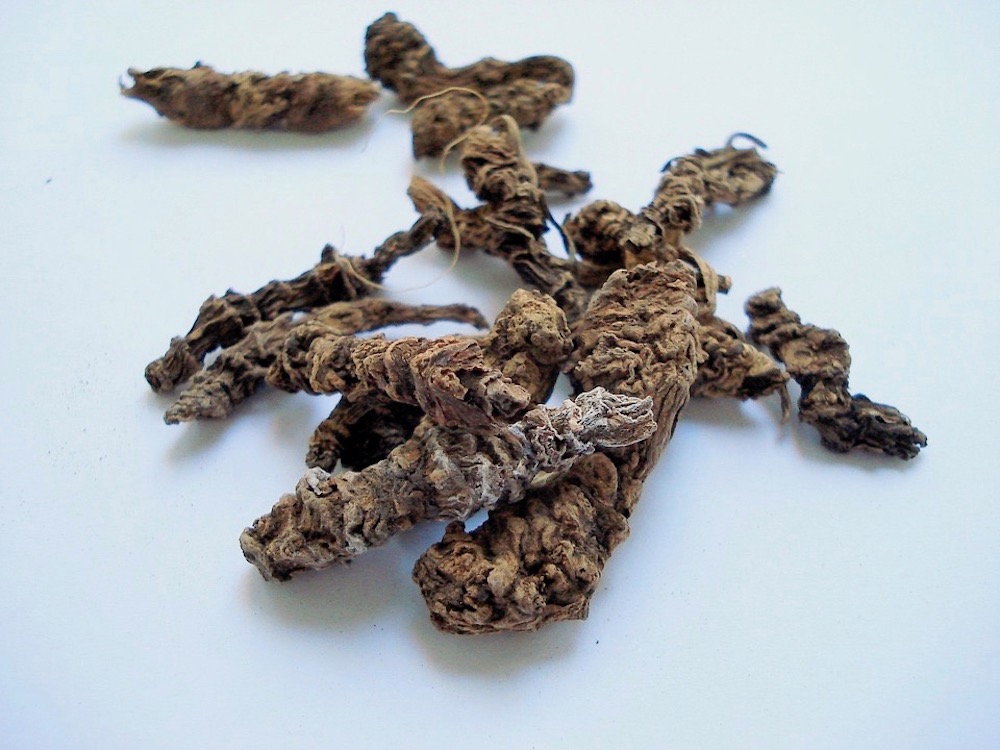
Valerian root is derived from a sweetly smelling flowering plant. So why does it smell like crap? That’s a good question, and a common criticism you’ll hear about the herbal remedy online.
The reason for its pungent odor is something found in the root called valerenic acid. Of course, valerenic acid is one of many properties you’ll find in the extract versions found in health food stores across the globe.
In the following article, we’ll be exploring the many benefits and the fewer concerns in deeper detail. But for now, let’s take a closer look at what you’re getting when you purchase valerian root.
Valerian Root: What’s In It?
The contents of valerian root are as follows:
- Alkaloids: examples are valerine and chatinine. These are naturally-occurring organic compounds. Can serve as neurotransmitters for better brain function.
- Isovaleramide: organic compound usually created during the process of extraction. This has a sedative effect on human beings.
- Gamma-aminobutyric acid (GABA): a neurotransmitter that acts as an inhibitor to lower excitement. Can be useful in preventing or dealing with anxiety.
- Isovaleric acid: your major culprit in the horrific smell of valerian root. Nevertheless, it is a calming agent. Interesting aside — when wine goes pungent and starts tasting like it was poured from an old boot, excess isovaleric acid is generally to blame.
- Iridoids: these monoterpenoids can guard against infections from microorganisms.
- Sesquiterpenes: pheromones found in plants and insects.
- Flavanones: have shown promise in the treatment of cardiovascular disease and cancer.
Now that you know the makeup of valerian root, we’re hoping you’ll find it easier to fight through the stink and get to the real benefits. But before going into what those benefits are, we should talk about how to handle it.
Storage Precautions
Roots have a shelf life of 2-3 years depending on if it’s ground up (the low end) or kept whole (the high end). Still, it can vary depending on the sourcing.
Just make sure that you’re storing valerian root in airtight containers. If you’re taking a pre-formulated supplement, follow the recommendations on the label.
Now that you’ve got a better idea of what it is and how best to keep it, let’s get into what it can actually do for you. Without further ado…
The Benefits
The benefits of valerian root are often debated in the science community. The research data for some of the claims still need to be worked out. But in Europe and Asia — where the plant naturally occurs — it has been used medicinally for hundreds of years.
There also are countless exhibits of anecdotal evidence involving people who claim to have derived significant healing benefits from using it.
As you’re about to see, those benefits may include something as low-level as relaxing muscle tension to something as significant as helping cancer patients. Let’s look at each one in further detail.

Valerian root often is used as a sleep aid for individuals who have trouble falling asleep on their own.
1. Acts as a Sleep Aid
The American Sleep Association reports that between 50-70 million US-based adults suffer from some type of sleep disorder. That’s at least 15 percent of the population. If extrapolated to the global population, we’re talking upwards of 1 billion people.
If the only fallout from that was a little grogginess in the morning and throughout the day, it wouldn’t be such a major issue. However, sleep disorders can lead to problems with eating and exercising as well as drug dependency. People who don’t sleep enough tend to have earlier ages of mortality as well.
The lesson: don’t skimp on the shut-eye! Valerian root is useful for many who suffer from poor sleep patterns because of the GABA receptor inhibitors it contains.
This can relax the body and the mind, and it may set up the person taking it to faster fall asleep.
2. Calms Anxiety
But even if you don’t get to sleep quicker from taking valerian root — or even if you don’t suffer from poor sleeping patterns — you might still see benefit from taking it for anxiety. In extreme cases, anxiety attacks can lead to potentially harmful situations.
However, your life doesn’t have to be threatened to be dragged through the mud by the inability to control and contain negative emotions.
If you have difficulty in social settings or high-pressure situations, then incorporating valerian root into your herbal army may help take off the edge.
Of course, each person will metabolize it differently, so the effects on one may not translate to another. Still, it’s something to keep in mind if you’ve struggled with anxiety over the years.
3. Relieves Pain
For many, valerian root isn’t just effective for calming fears and easing a racing mind. It also can have physical benefits, particularly with pain relief. The isovaleramide and flavanones are likely the reason when this benefit is present.
One important note, though. Valerian root should not be taken in place of other medications for pain relief, and it should not be taken without first consulting with your doctor.
For the most part, it does not have an addictive effect. But it’s possible that it could interact or interfere with existing medications.
4. Relaxes Tense and Restless Muscles
There’s nothing quite so frustrating as when you lay down to sleep at night. Your mind is tired. Your body, tired. But through impulse, the muscles in your legs or arms won’t slow down.
You toss and turn despite being exhausted. By the next morning, you’ve barely slept at all.
This condition is most commonly referred to as restless leg syndrome, but it can occur in other limbs. It can lead to sleep deprivation, which brings with it a variety of additional health problems.
The valerian root sedative effect helps to ease involuntary muscle movements, so you can get the sleep your body requires.
5. Improves Heart Function
Heart disease is one of the biggest killers, especially of men, in the US. What makes it so deadly is this: it sneaks up on you after a bunch of “little things” and warning signs that should have been addressed when they could have been, much earlier in life.
While valerian root may not be the best choice as a primary method of care, it does have contents capable of helping you effectively deal with stress. Stress and anxiety exacerbate problems related to blood flow.
Since your heart’s primary function is to pump blood throughout the body, anything that makes that easier to accomplish is helpful.
6. Can Help You Better Manage Stress
Stress can manifest in our lives in all sorts of ways. It can cloud your judgment. It can cause unexplained aches and pains. It can make you always feel tired or worn out. It can do all three at once.
When you’re overly stressed, it shows in your job performance, in how you interact with colleagues, in the strength of relationships with friends and family members.
Valerian root has a specific ability to calm your mind when the things you worry about are starting to overtake you.
Subsequently, you can avoid the chain reaction of health issues that stress brings with it.
7. May Ease ADHD Symptoms
If you’ve ever seen a child dealing with ADHD symptoms in class, then you know how difficult it can make the life for him and his classmates. Attention Deficit Hyperactivity Disorder affects children and adults.
It’s associated with children the most, but it also affects 11 million adults in the US alone.
It’s characterized by hyperactivity to the point that the child or adult can no longer control their impulses. While some old school adults may think you can take care of it with corporal punishment, the reality is that it’s a very real, very provable psychological disorder.
The use of valerian root gives ADHD patients a way to ease their movements and focus more on the tasks at hand.
8. Used on Menstrual Cramp Pains…
Many women will tell you the worst part of menstruation is the cramping that comes with it. You can try a lot of home remedies to control it, but at the end of the day, the body’s going to do what it’s going to do. Except…
Many women have found valerian root to be a helpful alternative in relieving the tension that causes cramping to occur.
You may not get rid of the problem altogether, but the same elements that lead to muscle relaxation and stress relief are responsible for reducing the effects of menstruation-related cramping. If you’ve ever been through it yourself, you know it’s worth a try.
9. …And Also Menopausal Symptoms
Menopause, in simple terms, is when a woman’s body ceases menstrual function. All women will go through this at some point in their lives, but it’s a lot more than the simple definition we’ve just shared.
In fact, it’s a process that brings with it 34 individual symptoms. That means 34 things that are “wrong” with you at the same time. Examples:
- Hot flashes
- Fatigue
- Lapses in memory
- Dryness of the vagina
- A lack of sex drive
- Periods that don’t occur with the same degree of regularity (when you’re about to go through it)
- Night Sweats
In other words, it isn’t a pleasant experience. And it takes some adjustment.
10. Can Boost Outlook of Patients in Cancer Therapy
There are few things more stressful and painful in life than dealing with cancer and the treatments that are used to combat it.
While there has been a rise in immunotherapy — and a better way to fight it — most oncologists still use chemotherapy, which is simply shooting poison into your system in hopes that you can kill enough of the cancer cells to prolong life until something better comes along.
Dealing with chemo is tough. It means a lot of laying around, feeling exhausted. Weight loss. Fears about your own mortality. The sedative function of valerian root may help patients to better cope with and recover from the damaging effects of chemo.
11. Assists Epileptics by Lowering Seizure Frequency
Epilepsy can be debilitating for the people who have it. It renders them unable to do things that most people take for granted (i.e., driving cars). The seizure element is largely to blame.
These involuntary spasms are not usually life-threatening, but they can be in the right situations. And they’re terrifying to observe.
Taking valerian root may not be able to prevent the triggers of a seizure, but it can reduce the severity of the spasms that a person may experience. If taken enough, it also might lower the frequency with which seizures occur.

Obsessive-compulsive disorder is yet another condition in which the sedative qualities of valerian root can help.
12. Scales Back OCD
OCD, or obsessive-compulsive disorder, occurs when those with the condition cannot control thoughts or repetitive actions. It can be debilitating in the social sense, and sometimes physically detrimental.
While the germaphobia aspects, or fear of contamination, can actually be a boost to one’s physical health, OCD also may take the form of hoarding.
Hoarding can lead to unsanitary conditions in which issues like staph infections become possible. Using valerian root may help to alleviate some of OCD’s more noticeable effects.
13. Can Relieve Digestion
One of the most painful aspects of digestive problems manifests in the form of cramps and bloating. The muscle relaxant aspects of valerian root carry over into the digestive realm.
Just like VR can ease the pains of menstruation, it can calm the stomach and help waste to more easily work through the digestive tract.
You’ll still want to pay attention to the number one aspect of helping digestion, though — eating right and exercising.
14. Aids with Cognitive Function and Memory Retention
There are numerous cognitive diseases that can shorten your lifespan or just make it harder to function in society. Some of the ones that most readily come to mind include the following:
- Dementia or Alzheimer’s disease: there are currently about 5 million people living with this heartbreaking condition in the US alone.
- Parkinson’s disease: a rarer disorder, Parkinson’s is nonetheless devastating as it impairs motor skills and leads to a steady physical decline. In the US, about 60,000 are diagnosed with it annually.
- Schizophrenia: affects about 1 percent of the population. Can create a very unstable and dangerous environment for the sufferer and (potentially) those he or she cares for.
- Major depressive disorder: an overall lack of caring about one’s existence, this condition is more common than most, and it can lead to devastating consequences.
- Primary progressive aphasia: this neurological condition impairs one’s ability to communicate progressively over time.
And that’s just a handful of what can go wrong. Valerian root won’t cure any of these illnesses, but what it may do is allow one to manage the stress that comes with these conditions more effectively.
15. May Address Fibromyalgia
Living with fibromyalgia can be brutal as it acts as an amplifier for pain throughout the body, and it can be chronic in nature so your pain level becomes something you just have to live with day-in and day-out.
Valerian root has a calming effect throughout the body that can mitigate the severity of this condition for some patients.
16. Could Protect the Kidneys
Lastly, the use of Valerian root may be able to protect your kidneys from degenerative conditions. This has a significant effect on the body as your kidneys are key players in the removal of waste from the body through the urinary process.
Without properly functioning kidneys, the body cannot survive.
There is still a lot of research that needs to be done about the benefits of valerian root on your kidneys, but there have been promising studies performed in rodents, particularly when it comes to kidney damage brought on by excess fats in the diet.
Now that we’ve covered the benefits of valerian root, let’s next turn our eye on the downside. Every herbal remedy — and every pharmaceutical remedy, for that matter — can have detrimental effects as each body is unique in its response.
So read the next section carefully, and speak to your doctor before consuming anything you’re not sure about.

Headaches are one of several possible side effects that users of valerian root may experience.
8 Possible Side Effects
Side effects are not that common with valerian root. It’s a substance that is generally considered safe. But reactions are possible, and they can run the gamut from mild to severe.
Let’s have a look at what might be of concern. If you experience any of these, consider scaling back until you can determine VR is safe for further use.
- Headaches: these are considered one of the milder outcomes that may happen when you start taking valerian root. If it just happens once or twice, then there isn’t really a cause for concern. Other factors easily could be to blame. But if you notice the timeline lines up with your taking of VR, then pay close attention. Also, see your doctor. They can make sure there isn’t another underlying condition to worry about.
- An Angry Stomach: one commonality of remedies — both herbal and pharmaceutical — is that it can transpose benefits for some users. This is particularly true with having an upset stomach. While valerian root is supposed to aid in digestion, it can sometimes have the opposite effect, leading to constipation or diarrhea depending on your personal reaction. If that occurs with regularity, cease use immediately.
- Cognitive Impairment: not everyone will react positively to VR’s sedative effects. If you feel cloudy after taking it or feel like your reaction and response time has suffered, then see your doctor and consider eliminating it from your routine.
- Dry Mouth: chronic dry mouth may be an indicator of a more serious health condition, so first make sure there isn’t something undiagnosed that needs to be addressed. If you’re all-clear, stop using valerian root for a bit and see if the condition clears up on its own.
- Feeling Excited or Uneasy: valerian root is supposed to have a calming effect, but some systems will metabolize it in the opposite direction. If you feel paranoid, jumpy or on-edge after taking it, then stop.
- Strange Dreams: not as serious of a side effect as some of the others on this list. Some of you may even enjoy it. But strange dreams can lead to difficulty sleeping, so use caution if this starts to occur.
- Daytime Drowsiness: constantly feel like you need a nap throughout the day while on valerian root? If that’s the case, you may want to stop taking it or at least adjust the time of day and the quantity that you are using. Few of us have the option of taking day-naps, so this should be addressed at once in order to not let it affect work performance or other important functions.
- Liver Problems: if you should experience any of the following — nausea, itching, upper stomach pain, loss of appetite, dark urine, clay-colored stools, or jaundice — either singularly or together, then valerian root may be causing a more serious issue with liver function. See your doctor at once to determine the cause.
Again, these are outcomes that have been observed in a very small number of users. Valerian root is generally safe for everyone, though the nature of its benefits and effectiveness can vary from person to person.
Keep that in mind before moving forward with it.
Valerian Root Is Worth the Try
Ultimately, we believe the potential benefits of using valerian root is worth the try because the alternative is pretty low-risk. That said, we all have our own unique challenges and conditions that we’re dealing with, so not everyone will experience the same types of outcomes using it.
Valerian root could be a godsend, but take precautions by looking into your own medical history and talking to a professional who can tell you whether there are any outstanding risk factors with your personal biochemistry.
Now, what do you say, readers? Have you used valerian root? What is your take on its effectiveness? Share your thoughts in the comments section below.





I have taken valerian root 800mg for insomnia the other night and got a pretty good night sleep. However, the second night it didn’t give me enough sleep. Thus edgy and felt weak the morning after. Will try again tonight one hour before bed time and see what happens tomorrow. I’ve tried other supplements such as Melatonin, prescribed Hydroxyzine and Trazodone, nothing works for me.